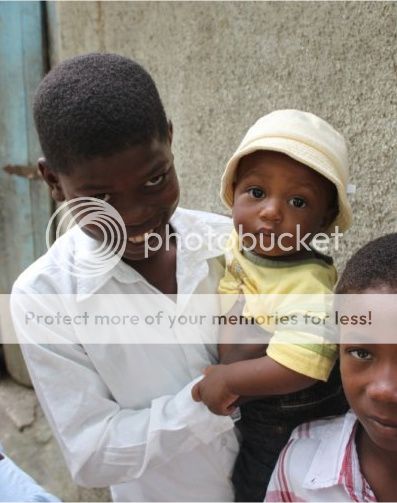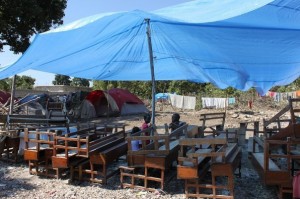Brian J. Stevens, a former reporter with the Haitian Times newspaper writes at America:
. . . As non-governmental organizations and foreign governments flood the country with desperately needed food, water and medical supplies, Haitian voices once again do not appear to be playing a role in helping to direct the aid where it needs to go. Residents of the southern Haitian city of Grand Goave told the Inter Press Service News Agency that there is “a network of seven neighborhood leaders for each section of the city that has not been tapped in the relief effort.” Aid workers are insisting that local leadership play a role. Dolores Rescheleit of the German NGO Arche Nova told IPS, “For us, it was very important to do this without military. Because the people in the camp are very strong. When you give the responsibility to the people in the camp, they will do it better than we will with the military.”
“A committee of Haitians, with sub-committees to handle security, hygiene, and aid distribution, is governing the camp without problems,” Rescheleit added.
…
Without an approach to relief and reconstruction that includes Haitian voices, the international community may meet the immediate need at hand, but the creation of a stable, self-sufficient Haiti will likely remain elusive.
This echos, a little, the messages that come through from Missionary Ed, over in Petit Goave, which I assume is near Grand Goave. Ed has written:
As we continue to give out food and supplies, I realized, we’ve been doing this for the last 14 years. We have a pretty good system. . . . It is a huge task and we are dealing with hundreds and they with thousands. I shared a few of our ideas with them, we’ll see what happens. One thing is to spread out the handouts and do them at the same time in different places. This breaks up the crowds and keeps would be bullies from being first in line at each stop…. They can’t be more than one place at a time.
 At church two weeks after earthquake, Photo by Ed
At church two weeks after earthquake, Photo by Ed
The people in Haiti should certainly know how Haiti “works;” they should be consulted about the handling of communities that are under great stress and will be further challenged by refugees out of Port au Prince. They should also be included in the management of recovering and rebuilding.
The story of one Haitian worker in Port-au-Prince illustrates this potential harm: Delande Jean-Michel is a technician at a private firm contracted by the Haitian electric company to provide power for the capital. . . . Since the quake the plant remains off-line while technicians from three foreign-based companies evaluate the damage and make repairs. The foreign technicians, engineers and specialists are working without accompaniment by Haitian employees, who remain idle.
In a phone interview, Jean-Michel expressed the anxiety of his fellow Haitians who had jobs at the plant before the quake, but now fear they may be in jeopardy. “In this phase, they don’t need Haitians,” Jean-Michel said he was told. “There’s a 50 percent chance I’ll get my job back,” Jean-Michel said, expressing concern that American companies and government institutions would over time effectively take over the country.
“There are many things that Haitians can do,” Jean-Michel said. “If they’re [foreign technicians] doing that work, they should have Haitians by their side. And it would create work.”
I would never stand for anyone denigrating the efforts of the US and other nations in getting aid, relief, medical attention and more to the Haitian people, but as repair and reconstruction begins, it must include the Haitian people, or the message they will be receiving is one that might be translated as part of the “soft bigotry of low expectations,” – a message that they are incapable of taking care of themselves. No one wants to hear that message. No one wants to be told they must live their lives by hand-out.
We Christians are often chided for saying that God’s ways are mysterious, and that sometimes bad things must happen in order for something better to occur. The Crucifix is our daily reminder of this truth; without it, there would have been no resurrection. Lately we have heard that the schools of New Orleans have been improved thanks to the need for ground-up reconfiguring after Hurricane Katrina. Out of the chaos of this earthquake, perhaps Haiti will become a tiny island that – with hands-up rather than hands-out assistance over a long stretch of time – will finally be able to stand on its own.
Crisis and opportunity go hand-in-hand, both for good or for evil. Relief countries and organizations have a chance to help Haiti not just to survive, but to thrive and become self-sufficient. Self-sufficiency cannot happen, however, in the shadow of those “soft bigotries” of low expectations, that often prevent the good hands of help from transforming into hands that can help themselves.
Related:
Handing out food to women helps insure that more get fed. I believe that. Feeding is what women know. It’s in our natures. Not that men can’t…it’s just different. Men and women are different. :-)











